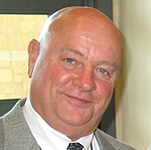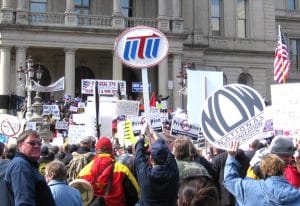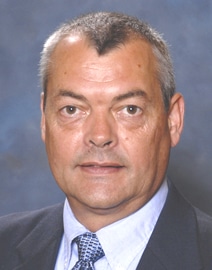
The UTU and the Terminal Railroad Association of St. Louis (TRRA) are jointly seeking an anti-terrorist security grant from the Department of Homeland Security (DHS).
If the grant is approved — with a DHS decision expected in August — the UTU and TRRA will collaborate on a three-year project to train front-line TRRA employees to enhance security awareness.
The project — with International employee Bruce Feltmeyer (UTU Local 1402, St. Louis) leading the UTU team — proposes joint UTU/TRRA creation of a security awareness manual, plus emergency preparedness classroom training, drills and exercises that will present various terrorist scenarios and means of recognizing, reporting and responding to terrorist threats against TRRA facilities.
The TRRA is a major railcar switching facility, with yards in downtown St. Louis and in the shadows of the Gateway Arch.
Daily, carloads of hazardous materials and other security-sensitive cargo are interchanged among most major railroads by TRRA train and engine workers. “The nature of TRRA’s operation, its importance to national rail-network reliability, and its location in the heart of a major U.S. city could make TRRA a high-priority target for foreign terrorists as well as disturbed individuals,” Feltmeyer said.
The UTU is currently working with Amtrak to develop training of conductors, assistant conductors, on-board service personnel and yard employees to enhance their abilities to recognize behavioral traits and deal with unruly passengers. That project is funded with forfeiture proceeds from federal drug-busts.
Additionally, discussions are underway with Class I freight railroads regarding joint UTU/railroad applications for federal grants to develop similar training programs for front-line Class I employees.
Feltmeyer, who is administrative assistant to UTU International President Mike Futhey, says the knowledge and understanding of vulnerability demonstrated by TRRA Police Chief George Muraski and former Amtrak Police Chief Ron Frazier will ““help to make a strong case for DHS funding of this joint UTU/TRRA project.”
At UTU regional meetings in San Antonio, Texas, and New York City in June and July, Feltmeyer will lead educational workshops on recognizing, reporting and responding to terrorist threats.
“Bruce Feltmeyer is uniquely qualified for this leadership task,” Futhey said. “During his years of rail service, he has developed training programs for the on-line UTU University; and, as a Union Pacific employee, he helped to develop customer-service related training materials for conductors and newly hired managers.
“Bruce also taught business software as an adjunct professor at a St. Louis community college,” Futhey said.
 ment, Social Security and Medicare by mounting a counter attack on political extremists intent on destroying organized labor and all it has achieved for working families.
ment, Social Security and Medicare by mounting a counter attack on political extremists intent on destroying organized labor and all it has achieved for working families.
 A 17 percent pay increase, retention of the $200 monthly cap on health care cost-sharing, FRA certification pay, a faster process for new hires to reach full pay rates, and no rollback of the January 2011 cost-of-living adjustment (COLA) highlight the new five-year national rail agreement negotiated between the UTU and the National Carriers’ Conference Committee (NCCC).
A 17 percent pay increase, retention of the $200 monthly cap on health care cost-sharing, FRA certification pay, a faster process for new hires to reach full pay rates, and no rollback of the January 2011 cost-of-living adjustment (COLA) highlight the new five-year national rail agreement negotiated between the UTU and the National Carriers’ Conference Committee (NCCC).